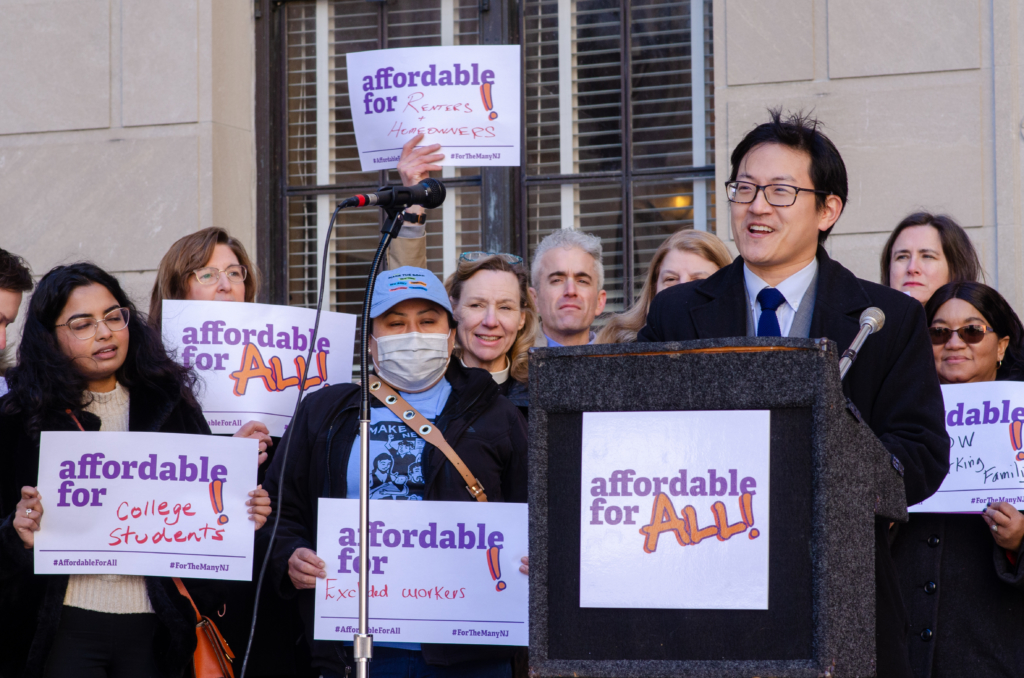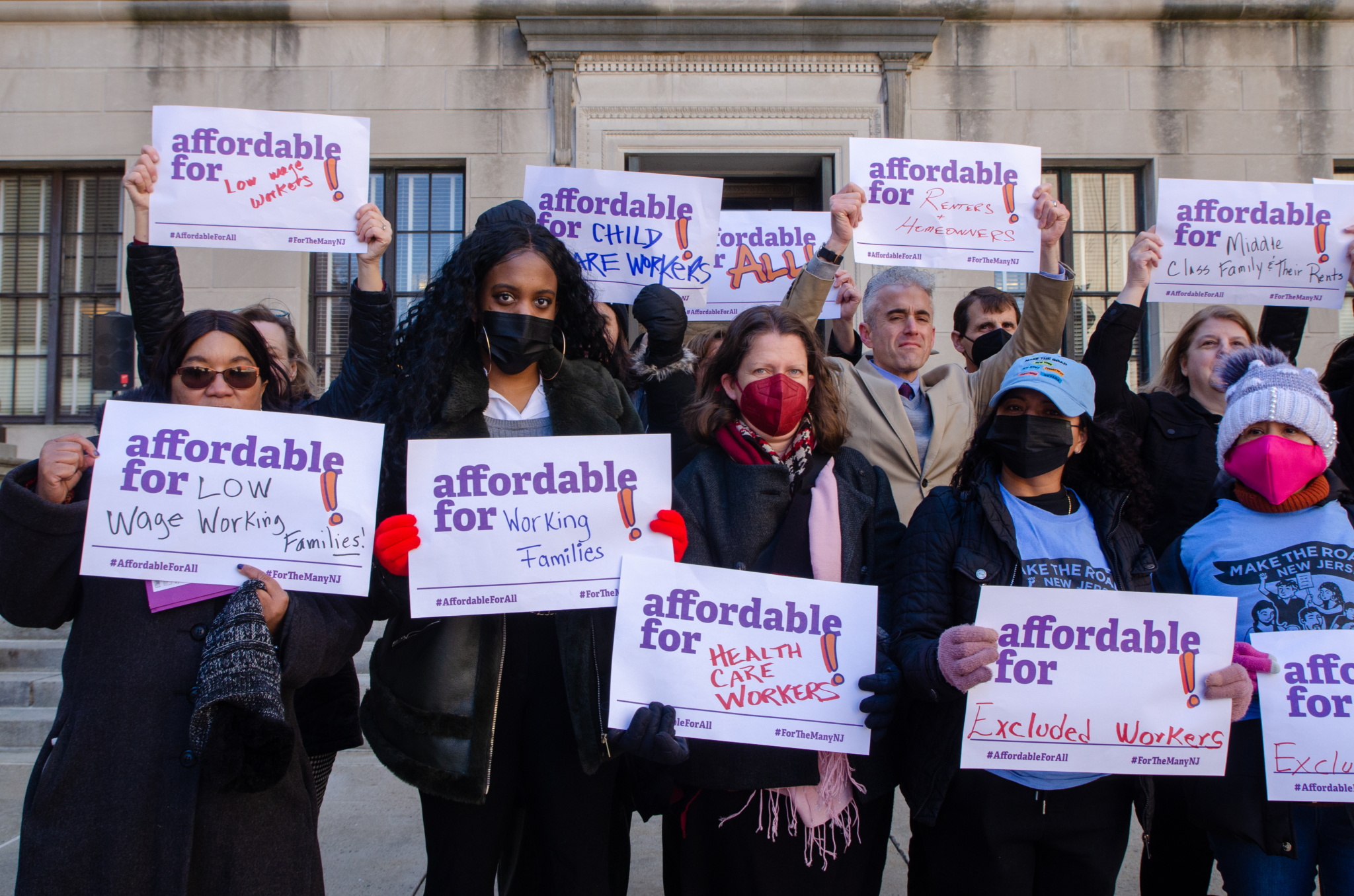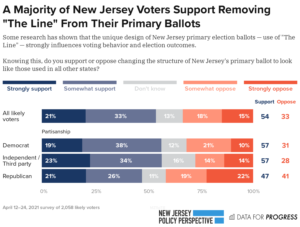Labor unions, faith leaders, essential workers, and advocates for immigrants’ rights, housing, and the environment panned the newly approved state budget as a missed opportunity to provide transformative relief to working families who need the most help. With billions of dollars in surplus and federal aid, the state budget was crafted behind closed doors, shut members of the public out of the process, and, as a result, left out important investments that would have benefited low-paid workers and their families.
When billions of dollars in funding are negotiated away from the public eye, it’s inevitably the public who loses out. The hard-working New Jerseyans who are struggling the most with rising prices, rent, and inflation do not have highly-paid lobbyists and special-interest dollars to fight for them. This budget could have made New Jersey affordable for all, but instead directed the state’s record-setting surplus towards tax relief for wealthy homeowners, corporations, and a gimmicky sales tax holiday.
Although there are many important and much-needed investments in the budget, a lack of transparency and accountability for the way public money is spent leads to worse outcomes for the people who have the least. Notably, the budget lacks proposals to expand safety net programs, tax credits, and assistance to those with the lowest incomes: Cash assistance in Temporary Assistance for Needy Families (TANF), the Earned Income Tax Credit (EITC), the Excluded New Jerseyans Fund, and hazard pay for essential workers.
Nicole Rodriguez, President, New Jersey Policy Perspective (NJPP):
“New Jersey’s working-class residents, immigrant families, and essential workers have faced serious economic challenges since the pandemic, and this budget should have been the prime opportunity to support them with direct relief. Instead, their voices were shut out of the budget process, while behind-the-scenes deals secured hundreds of millions in pet projects and corporate giveaways. With a growing and diverse population, New Jersey should not be a state where a few powerful people make decisions that affect the many without taking their voices into account.”
Rev. Sara Lilja, Executive Director, Lutherans Engaging in Advocacy Ministry:
“The bible teaches us that where your treasure is, there your heart is also. This budget reveals that our heart does not regard low and working families as essential. It is often said that budgets are moral documents; this budget does not align with a morality that is committed to supporting the hundreds of thousands of essential working families that are the economic engine of our state. Morally, our state budget should be for the many, not just the powerful elite.”
Laura Bustamante, Policy and Campaigns Manager, New Jersey Alliance for Immigrant Justice:
“It has been our immigrant workers who have helped us survive through this pandemic. There is still no meaningful or permanent relief for those who continue to put their lives at risk and have been excluded from aid. Essential workers have put their lives at risk and on the line day in and day out and today the legislature turned their backs on immigrant families and working people. The State needs to do more for those who risk their lives everyday.”
Marcia Marley, President, BlueWaveNJ:
“I applaud this budget for its commitment to housing, education, reproductive health, and the new Child Tax Credit. Unfortunately, it leaves out many working families, like those from our immigrant community, misses an opportunity to address the racial wealth gap, and is not bold enough on transit and infrastructure issues where we continue to ignore the need for dedicated funds.”
Kevin Brown, Executive Vice President and NJ State Director, SEIU 32BJ:
“We are disappointed to have to write these words again, but on behalf of our 13,000 hardworking SEIU 32BJ members living and working in New Jersey, we strongly and unequivocally condemn the lack of public transparency around this year’s budget process. Working families deserved a voice in the allocation of the budget’s historic surplus, which presented an unprecedented opportunity to improve affordability and level the playing field for the middle class and low wage workers. While we applaud the Legislature for expanding the Child Tax Credit, there is so much more they could have done to transform the lives of essential workers in our state during an unprecedented time of massive budget surpluses.”
Julie Larrea Borst, Executive Director, Save Our Schools NJ Community Organizing:
“Save Our Schools NJ applauds the continued steps toward fully funding our K-12 schools and the expansion of preschool. We are disappointed that the state’s huge budget surplus was not used to restore funding to S2 districts and that the funding allocated for the Schools Development Authority fell far short of what is needed for school construction and repairs in our most impoverished school districts. If we cannot meet these needs now, when the budget is abundant, then when can the Legislature step up and do the right thing?”
Banessa Quiroga, member of Make the Road New Jersey:
“This budget is a missed opportunity for essential workers like me and for immigrants across New Jersey. The Legislature has failed to fund the Excluded New Jerseyans Fund or hazard pay, and left out key, bi-partisan measures like the Earned Income Tax Credit expansion. These measures would have helped my family make ends meet in a time of unprecedented inflation and skyrocketing rents. Instead, the budget rewards upper middle class homeowners with tax breaks.”
“Unfortunately, once again the Legislature has chosen to have an opaque budget process, entirely completed in the private backrooms of Trenton, that intentionally excluded the voices of New Jersey citizens and advocates. This is the largest budget in the state’s history and it presented enormous opportunity to address so many issues faced by every day New Jerseyans, but instead they decided to forge ahead with a broken process where no one even saw the budget until after it was voted on in committee and gave no real opportunity for public input.”Barbara Rosen, RN and First Vice President, HPAE:
“HPAE nurses and health care workers argued for, lobbied and, ultimately, challenged Gov. Phil Murphy and state legislators to adequately fund the operation of New Jersey’s only public hospital by raising the annual budget allocation for University Hospital in Newark to $151.1 million. Unfortunately, the 2023 Fiscal Year budget calls for just $44.7 million for University Hospital in Newark. This does not meet the needs of patients, workers and the community served by the hospital. This allocation is a profound missed opportunity at a time when the state has actual resources to put its money where its mouth is. University Hospital in Newark is committed to continuing as an anchor institution in the municipality and the Northern New Jersey region. In addition to the crucial, direct patient care that UH provides, it has a vital and unrivaled role as a public health institution in the state.”Joe Marchica, Our Revolution Trenton Mercer Chapter Chair and OR New Jersey Member:
“Yet again, our legislature drops a complex budget document on representatives, advocacy groups, and the public with next to no time for us to properly analyze and assess the most important piece of legislation in New Jersey each year. This budget mostly ignores the opportunity and necessity to invest in our people. It prioritizes the interests of the wealthy, instead of the programs needed to establish and maintain an economy that works for all of us. We do, however, applaud one notable exception to this: the inclusion of a Child Tax Credit, which is a bright spot in an otherwise gray budget.”Latino Action Network:
“Given unexpected tax revenues, the state of New Jersey was uniquely positioned to invest in and care for the communities who were hardest hit during this pandemic – the working class, communities of color, and Immigrant New Jerseyans. Instead, politicians ignored transparency and have continued to leave out budget reforms which could improve the lives of millions of New Jerseyans. New Jersey’s leadership cannot continue to tout New Jersey’s diversity and multiculturalism on the one hand and do little to materially support our communities on the other. It’s high time to create budgets that center the most marginalized.”



